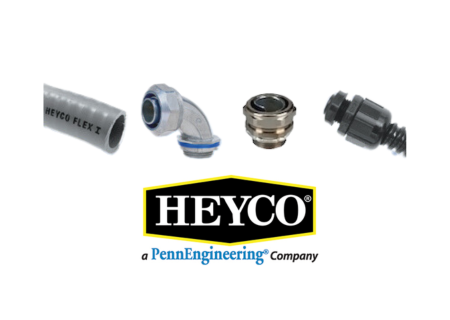HTF is excited to highlight once again our partner, Heyco®, and their flexible conduits. Heyco® was founded in 1926 as a designer and manufacturer of molded wire protection products and stamped electrical components. They were purchased by longtime HTF partner PennEngineering in 2016. Heyco® has years of experience with high-volume manufacturing.
The engineers at Heyco® are experienced in utilizing the latest AutoCad, Pro-E, mold-filling analysis software, and hardware to provide excellent product design, modification, and rapid prototyping. This allows the team to go from an idea to a model of the product in less than 24 hours. They also provide tool design, injection molds, and stamping dies with superior quality. Let’s review the Heyco® line of flexible conduits.
When power is supplied to the exterior of a building, the wiring needs to be protected from the elements. Conduit is tubing used to encase the wiring and protect it from the forces of nature over time. Heyco-Flex® type conduit and corrugated tubing are mainly used in solar applications and come with various couplings, hubs, and fittings. The conduit comes in nylon and PVC with metal, plastic, nylon, or PVC fittings.
Benefits of Flexible Conduits
Several types of flexible conduit fit different applications, making it a very versatile option. The first and most important step in determining which flexible conduit to install is to know your local code requirements and safety standards to ensure those are being met and your installation will pass inspection. A flexible conduit is more affordable than a rigid conduit and is an ideal choice for many projects. It is also durable and longer lasting than exposed wiring.
Installation Process
To prepare for conduit installation, you must determine the proper materials based on where the conduit is installed and your area's regulations. The next step is to determine the best route for the conduit and carefully measure it to determine the length of the conduit run and what connectors will be necessary. The box should have a knockout where you can make a connection point between your power source and the conduit.
Finally, installing high-quality clips to hold the conduit in place will ensure the longevity of the installation. A local inspector is an excellent resource for troubleshooting which materials you will need. HTF is also here to walk through the conduit options for your application.
Considerations for Different Environments
Outdoor Installations
Liquid tight flexible metal conduits (LFMC) are used when protecting cables is necessary, and flexibility is also a priority. It allows the conduit to be bent but has a waterproof jacket, making it ideal for exposure to hazardous areas. There is also an option for flexible non-metallic conduit (LNFC), available in several varieties, including waterproof and flame-resistant jackets.
Indoor Installations
Flexible metallic tubing (FMT) is the most common choice for homeowners performing indoor installations because it is easy to bend.
Industrial Installations
Commercial indoor installations benefit from flexible metallic conduits (FMCs), which are an excellent substitute for rigid conduits but are not waterproofed and are not the appropriate choice for an exterior installation.
HTF and Heyco® Flexible Conduits
The flexible conduit from Heyco® comes in flexible metallic variations for indoor use and flexible jacketed options for outdoor use to protect from the elements and hazardous conditions. Installation is simple for professionals and homeowners alike due to the flexibility, material options, and accessories.
When determining the proper conduit for your installation, first know the local regulations or contact an inspector. Then call us at HTF, and we will aid you in choosing the perfect materials for your conduit installation. Reach out today for a quote!









